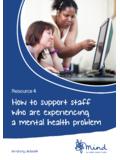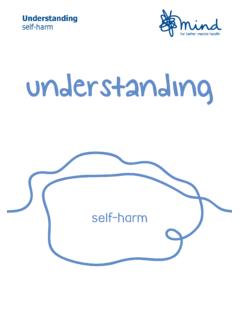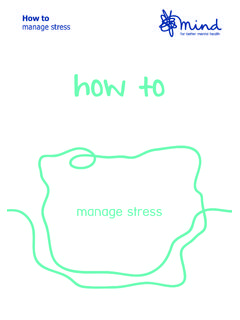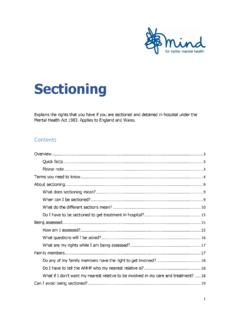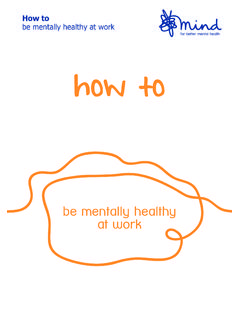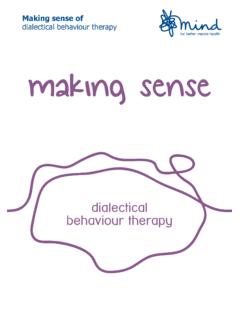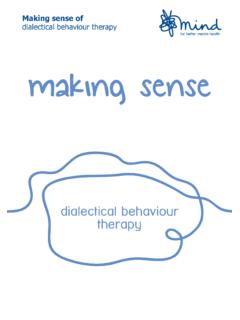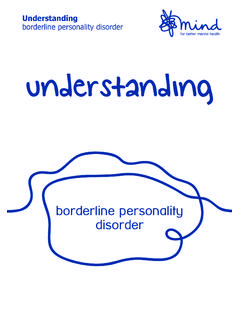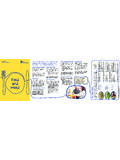Transcription of Anger - Mind
1 mind 2018. Anger Explains Anger , giving practical suggestions for what you can do and where you can go for support. Also includes advice for friends and family. If you require this information in Word document format for compatibility with screen readers, please email: Contents What is Anger ? .. 2. What does Anger feel like? .. 3. Why do I get angry? .. 4. What can I do to manage my Anger ? .. 6. How can I control my Anger long term? .. 8. What help is available? .. 10. What can friends and family do? .. 14. Useful 16. 1. mind 2018. What is Anger ? We all feel angry at times it's part of being human.
2 Anger is a normal, healthy emotion, which we might experience if we feel: attacked deceived frustrated invalidated or unfairly treated It isn't necessarily a 'bad' emotion; in fact it can sometimes be useful. For example, feeling angry about something can: help us identify problems or things that are hurting us motivate us to create change, achieve our goals and move on help us stay safe and defend ourselves in dangerous situations by giving us a burst of energy as part of our fight or flight system Most people will experience episodes of Anger which feel manageable and don't have a big impact on their lives.
3 Learning healthy ways to recognise, express and deal with Anger is important for our mental and physical health. (Our pages on managing outbursts and long-term coping have some tips on how to deal with Anger .). When is Anger a problem? Anger only becomes a problem when it gets out of control and harms you or people around you. This can happen when: you regularly express your Anger through unhelpful or destructive behaviour your Anger is having a negative impact on your overall mental and physical health Anger becomes your go-to emotion, blocking out your ability to feel other emotions you haven't developed healthy ways to express your Anger It feels like there's a ball of fire in the middle of my chest that blurts its way straight out of my mouth and burns the people around me.
4 What is unhelpful angry behaviour? How you behave when you're angry depends on how well you're able to identify and cope with your feelings, and how you've learned to express them (see our page on causes of Anger for more information). Not everyone expresses Anger in the same way. For example, some unhelpful ways you may have learned to express Anger include: 2. mind 2018. Outward aggression and violence - such as shouting, swearing, slamming doors, hitting or throwing things and being physically violent or verbally abusive and threatening towards others.
5 Inward aggression - such as telling yourself that you hate yourself, denying yourself your basic needs (like food, or things that might make you happy), cutting yourself off from the world and self-harming. Non-violent or passive aggression - such as ignoring people or refusing to speak to them, refusing to do tasks, or deliberately doing things poorly, late or at the last possible minute, and being sarcastic or sulky while not saying anything explicitly aggressive or angry. My brain goes blank and I absent-mindedly release my Anger through physical violence towards myself or objects around me.
6 I don't realise how destructive I've been until immediately afterwards.. If you find you express your Anger through outward aggression and violence, this can be extremely frightening and damaging for people around you - especially children. And it can have serious consequences: it could mean you lose your family, job and get into trouble with the law. In this case it's very important to seek treatment and support. But even if you're never outwardly violent or aggressive towards others, and never even raise your voice, you might still recognise some of these angry behaviours and feel that they're a problem for you.
7 For example, you turn your Anger inwards and self-harm or deny yourself food. I internalise Anger and punish myself by self-harm.. What does Anger feel like? Anger feels different for everyone. You might experience some of the things listed below, and you might also have other experiences or difficulties that aren't listed here. Effects on your body a churning feeling in your stomach tightness in your chest an increased and rapid heartbeat legs go weak tense muscles you feel hot you have an urge to go to the toilet sweating, especially your palms a pounding head shaking or trembling dizziness 3.
8 mind 2018. Effects on your mind feeling tense, nervous or unable to relax feeling guilty feeling resentful towards other people or situations you are easily irritated 'red mist' comes down on you feeling humiliated Recognising these signs gives you the chance to think about how you want to react to a situation before doing anything. This can be difficult in the heat of the moment, but the earlier you notice how you're feeling, the easier it can be to choose how to express and manage your Anger . The best advice I was given was to stop briefly once I am angry to ask myself what painful emotion I am feeling in the situation where I became angry.
9 A bit of compassion for my own pain often stops me from taking that pain out on others.. Why do I get angry? Feelings of Anger arise due to how we interpret and react to certain situations. Everyone has their own triggers for what makes them angry, but some common ones include situations in which we feel: threatened or attacked frustrated or powerless like we're being invalidated or treated unfairly like people are not respecting our feelings or possessions People can interpret situations differently, so a situation that makes you feel very angry may not make someone else feel angry at all (for example, other reactions could include annoyance, hurt or amusement).
10 But just because we can interpret things differently, it doesn't mean that you're interpreting things 'wrong' if you get angry. How you interpret and react to a situation can depend on lots of factors in your life, including: your childhood and upbringing past experiences current circumstances. Whether your Anger is about something that happened in the past or something that's going on right now, thinking about how and why we interpret and react to situations can help us learn how to cope with our emotions better. It can also help us find productive strategies to handle our Anger .
